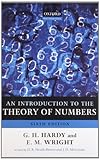THEOREM 48. ey is irrational for every rational y≠0.
If y=h/k and ey is rational, so is eky=eh , Again, if e-h is rational, so is eh. Hence it is enough to prove that, if h is a positive integer, eh cannot be rational. Suppose this false, so that eh=a/b where a,b are positive integers. We write
so that F(0) and F(1) are integers. We have
Hence
an integer, But, by †(4.7.1)
for large enough n, a contradiction. □
出典:G.H.Hardy and E.M.Wright. An Introduction to the Theory of Numbers P54. THEOREM 48.
―――――――――――――――――――――――――――――――――――――――――――
訳と補足:
f(x)や†式(4.7.1)、補題については、前回のπの無理性の証明で用いたものと同じであるため、本稿では省略する。
定理48. y≠0が有理数であれば、ey は無理数である。
y=h/kとeyが有理数とすると、eky=ehである。e-hが有理数とすると、ehも有理数である。これより、hを正の整数として、ehが有理数であり得なければ、証明として十分である。eh=a/bとし、a,bが正の整数であると、誤った仮定をする。ここで、
とする。F(0)とF(1)は整数である。これにより、
を得る。これより、
となる。これは整数である。しかし、式(4.7.1)と前回の補題より、nが十分大きい場合は
となり矛盾する。 □
―――――――――――――――――――――――――――――――――――――――――――
引用元のTheory of Numbersでは、前回のπの無理性の証明よりも、今回の内容の方が先に記されていたため、今回の方が背理法についての詳しい記載がある。どちらの証明も結果も、意義のあるものであるため、初めにこの2つについて触れておきたかった。
今回の内容については、前回と同じ関数を用いて同じ方法で示しているため、前回からの引用という形で、ほとんど訳しただけである。また、最後の式が1未満であることが、前回の補題の結果から理解できることも同じである。
 | An Introduction to the Theory of Numbers 5,406円 Amazon |

